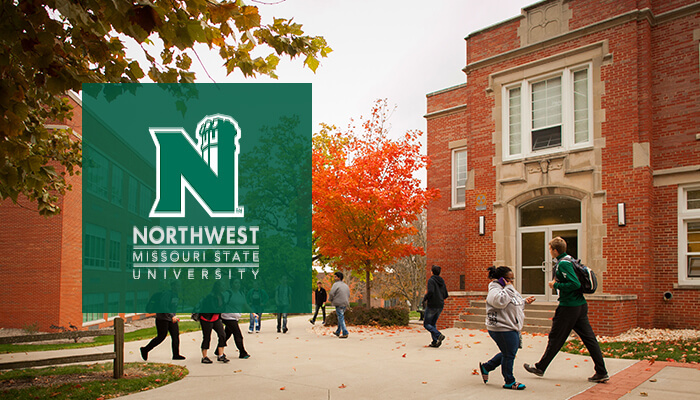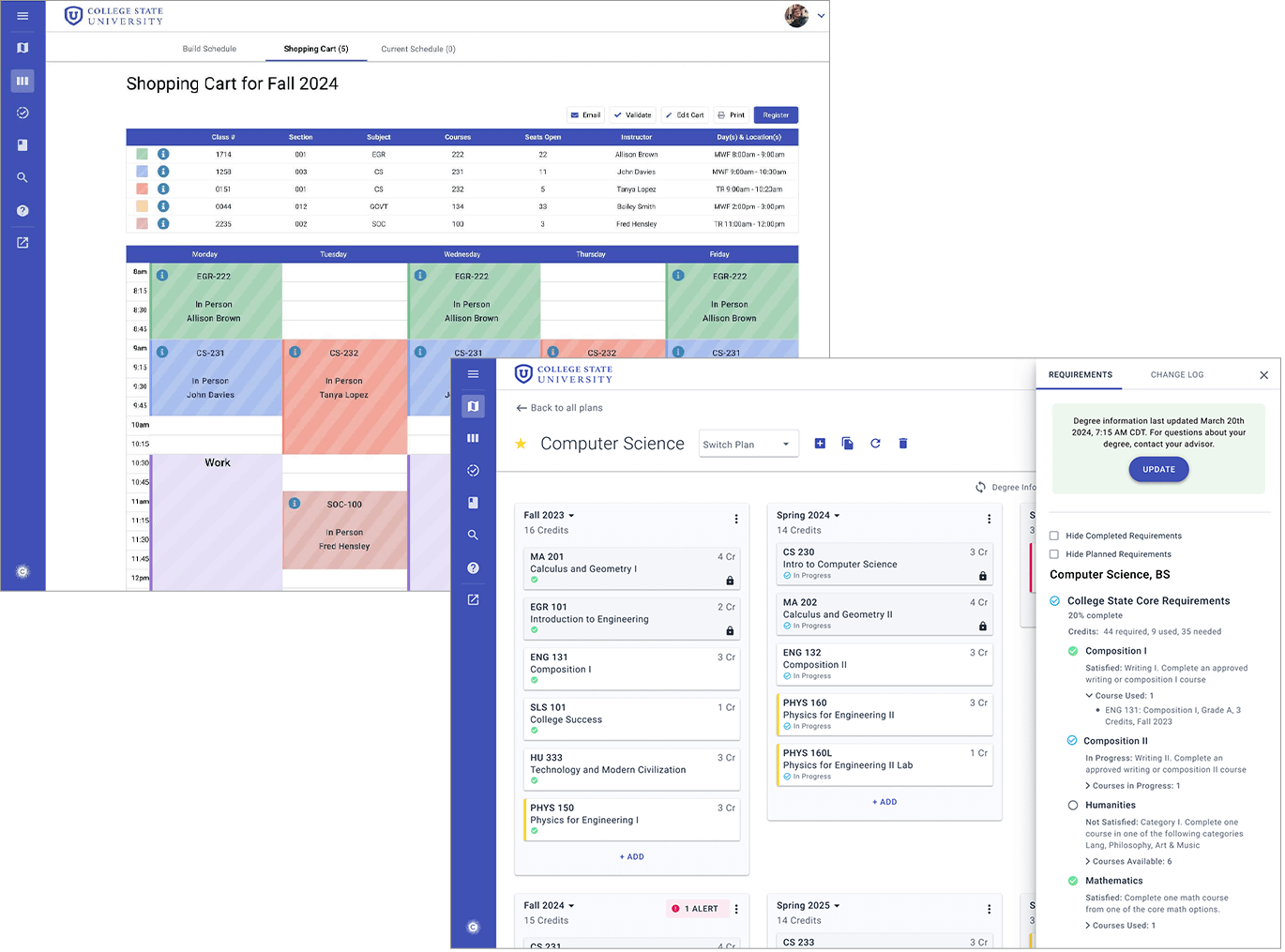
3.9% Lift in Persistence After Adopting Integrated Academic Planning and Student Scheduling
Share this Post
The Challenge: Northwest recognized the need to have a consistent, intuitive process for registration and remove barriers in their path to graduation.
The Strategy: Implement an end-to-end planning, scheduling, and registration system to make it easy for students to receive guidance and find the classes they need to complete their degree.
The Outcomes: A unified approach to the registration experience lifts persistence and supports efficient ways for advisors to connect with students and support their journey to on-time graduation.
Since its founding in 1905, Northwest Missouri State University (Northwest) has been renowned for cultivating educators, innovators, and leaders. Guided by a mission centered on student success—”every student, every day”—Northwest is committed to supporting the diverse goals of its 9,664 enrolled students on their academic journey.
However, working with students’ academic plans where courses are manually entered on a spreadsheet made it difficult for advisors to focus on anything beyond the next term. It was also very burdensome to rebuild the plan if adjustments were necessary. Additionally, advisors and the registrar’s team invested significant time manually preloading students’ schedules before new student orientation.
Recognizing the need for improvement, Northwest searched for a solution to help students simplify their path to graduation and remove any barriers to enrolling for the next term. In alignment with its commitment to student success, Northwest invested in technology to streamline academic planning, scheduling, and registration. By combining these steps into one intuitive process, they can remove barriers to enrollment caused by a confusing registration experience.

“I can focus more on what will happen in the future than just focusing on a given semester. It’s more a visual tool to think ahead and adjust things in advance before it’s too late.”
— Leslie Abarr-Cuenca,
Director of Student Success, Northwest Missouri State University
Challenge: Address inefficiencies in registration experience to remove barriers to graduation
Northwest needed a cohesive approach to degree planning to prevent distractions that affected students’ focus and timely graduation. Advisors used various tactics to help students plan, from spreadsheets to handwritten worksheets but lacked a centralized system for communication. This led to gaps in students’ plans and repetitive explanations to staff across campus. This was frustrating for students and advisors and made it more time-consuming to identify the classes students needed to take each term.
Aligning the entire university was critical to understanding a comprehensive view of each student’s journey, as students perceive the institution as one entity. Breaking down silos and creating a unified perspective across all areas of student interaction—including advisors, faculty, information technology, student account services, the registrar’s office, and beyond—was essential.
Additionally, manually selecting courses for 1,200 incoming students to prepare for orientation highlighted an opportunity to streamline administrative processes. This task proved extremely time-consuming for advisors and the registrar alike. Since changes were not reflected in real-time, it was difficult for students to troubleshoot issues independently when a class was full or obtain assistance from the registrar’s office if they didn’t have the necessary prerequisites.
Strategy: Implement a simplified registration process to ease enrollment
Transitioning between platforms often creates more opportunities for errors during the registration process, making it easy for students to overlook a section number or abandon the process altogether. At Northwest, students previously navigated from a list of selected courses, often on paper or in a spreadsheet, to scheduling software and then to their Student Information System (SIS) for registration, frequently leading to an incomplete enrollment. Through collaboration with Civitas Learning, significant improvements have been made, including:
Streamlined academic planning and registration
Taking the guesswork out of planning and knowing what courses students must take to graduate has been transformative for Northwest students. Instead of patching together a plan and hoping it meets the current degree standards, the planning solution extracts degree requirements straight from Northwest’s audit data so students and advisors can see what courses are needed to finish their degree on time.
When the course schedule is available, students use their plan and can automatically generate all potential schedules in the same experience. Advisors can see what students are planning to register for and ensure they don’t have any errors that will get them off track. Students can then register directly from their planned schedule without moving to a different platform. Ultimately, this approach supports enrollment and persistence goals by providing students with a clear path to graduation and the flexibility to accommodate their lives outside of school.
For continuing students, the ability to modify their plans independently before meeting with advisors has been game-changing. They can take ownership of their plan and come prepared to discuss any changes that need to happen.
Northwest can also view how this feature impacts persistence using Civitas Learning’s Initiative Analysis Solution. Knowing how initiatives impact persistence helps them better understand where to allocate resources. Plus, it helps the enrollment and advising team tell their story to other areas of the institution.
Using the Initiative Analysis solution, Northwest validated the efficacy of using Academic Planning by observing a notable increase in persistence among students who logged in compared to those who used other course mapping methods. Additionally, by giving students visibility into upcoming coursework for the next term, Northwest witnessed a significant 10.7 percentage point increase in persistence compared to those who did not use the planning tool.
4 Ways a Connected Registration Experience Removes Barriers to Completion
Unified communication and advising documentation
This intuitive approach to planning leads to more impactful advising conversations. Time gained through this more efficient process allows advisors to focus on other student success efforts and creates a uniform approach to documenting notes and other information. With first- and second-year students receiving both a professional advisor and faculty mentor, finding ways to share notes and meeting documentation across the university was needed to ensure that everyone was unified in their strategy for helping the students.
The planning solution allows advisors to view the same plan as students, offer guidance, and collaborate in real-time with planned comments. Advisors can also proactively notify advisees who plan to register for filled classes, offering alternative options to avoid last-minute registration. Civitas Learning’s advising workflow tools make it easy for advisors to add a note recapping the classes discussed during an appointment and provide students with enrollment pins before their registration period is open.
Academic plans should be flexible and adaptable. Having the necessary tools to support this model empowers students to modify their plans without imposing a significant burden on the registrar and advising team. Clear access to information and effective communication channels embody Northwest’s dedication to student support.
Improved administrative workflow and efficiency
Implementing an end-to-end planning, scheduling, and registration system has significantly reduced the load on advisors and administrators. Before using Civitas Learning, advisors manually selected courses for more than 1,200 incoming students and passed the course schedules on to the registrar’s office to enter them into the system. This process was tedious and took time away from efforts to support students.
With Civitas Learning’s scheduling solution, advisors can easily preload students into the courses they need before orientation without the registrar’s support. This way, students can register directly from the scheduling solution. This allows advisors to spend less time building a course schedule during their orientation advising meeting and more time preparing students for the upcoming term.
This streamlined process reduces the administrative burden on advisors and eliminates the need for the registrar’s office to input courses on behalf of students. Additionally, advisors can communicate directly with students about their plans within the same experience, making meetings more efficient and freeing up time for advisors to better connect with students to address other barriers to completion.
Integrated Approach to Student Success Leads to 8% Retention Lift at Northwest Missouri State University
Outcome: Improved persistence, greater student satisfaction, and eased administrative processes
Northwest has experienced widespread adoption and positive feedback since implementing an integrated planning, scheduling, and registration experience. Of the students who responded to the Ruffalo Noel Levitz Student Satisfaction Inventory administered in Fall 2023, 73% of the students indicated they were satisfied or very satisfied with the item “Northwest Scheduler is helpful in selecting classes and registering.
The intuitive planning feature has notably enhanced advisors’ ability to see a complete picture of their students’ academic paths. Advisors and students can easily communicate about changes or questions about their plans within one platform. Northwest staff also observed tremendous improvements in administrative efficiencies by bringing manual processes within the integrated workflow and saving the registrar’s office and advisors from cumbersome tasks such as manually entering courses for incoming students.
Noteworthy results from the analysis of the academic planning and scheduling solution include:
- 82% of students who utilized the planning feature in Spring 2023 persisted to Fall 2023, compared to only 44% of students who did not use the planner.
- 84% of students who used the scheduling feature in Spring 2023 persisted to Fall 2023, compared to 44% of those who scheduled through alternate methods.
- 73% of the students indicated they were satisfied or very satisfied with the item “Northwest Scheduler is helpful in selecting classes and registering” in the Fall 2023, Ruffalo Noel Levitz Student Satisfaction Inventory.
Northwest also observed how the planner positively impacts persistence using the Initiative Analysis solution. Specifically:
- 3.9 PP lift in persistence for students who logged into academic planning compared to students who did not log into the academic planning.
- Planning 2024 courses during the fall of 2023 led to a notable 10.7 percentage point increase in persistence for those students from fall to spring.
For more information on how student-centered planning and scheduling improves outcomes, check out Civitas Learning’s solution here.




